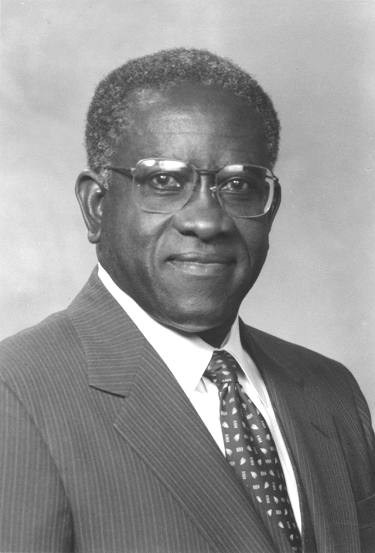Andrew F. Brimmer*
Class of 1974
- Board of Governors Federal Reserve System

There is no way to make any headway, to have any kind of success in the world of the future, unless you are well prepared.
The son of a sharecropper, Andrew Brimmer was born in Newellton, Louisiana, in 1926. He grew up in the 1930s in that small, poor, and racially segregated Mississippi River farm town. To earn extra money, his mother raised chickens and cows, and young Brimmer and his siblings picked cotton.
Brimmer's parents had high standards and values, and their constant encouragement instilled self-confidence their children. "My parents encouraged me to stay in school," he said. "They wanted me to do something that was worthwhile."
The Great Depression that gripped the nation in the 1930s was especially hard on the South, where the boll weevil invaded and pillaged most of the local cotton crop. Eventually, Brimmer's father found a job in a grain warehouse. His mother's side business with cows and chickens showed her to be the entrepreneur of the family. "She taught me perseverance and drive," said Brimmer. "My father didn't have a lot of education, but he always understood the role of education and put the stress on education and good behavior."
Brimmer attended an all-black high school 13 miles from his home. He was inspired by an English teacher to consider a career in journalism, but his school, like many in the Deep South, went to only the 11th grade. Furthermore, the educational standards in black schools were inferior.
Seeing no future for himself in Newellton, Brimmer moved to Bremerton, Washington, to live with one of his sisters and her husband. Brimmer worked as an electrician's helper at Bremerton Navy Yard and took journalism courses at a nearby school. One year later, in 1945, he entered the U.S. Army. Upon his discharge in 1947, Brimmer enrolled at the University of Washington. He had developed an interest in economics and made that subject his major. He graduated in 1950 and earned a master's degree the following year. His academic skills earned him a Fulbright Fellowship, which took him to the University of Delhi and the University of Bombay in India. Upon his return, he earned a doctorate from Harvard in 1957.
After three years as an economist at the Federal Reserve Bank of New York, Brimmer joined the faculty of Michigan State University as an assistant professor of economics. He later taught at the University of Pennsylvania's Wharton School of Business. In 1963, he was named U.S. deputy assistant secretary for economic review at the U.S. Department of Commerce. In 1965, he was promoted to assistant secretary for economic affairs. In 1966, President Lyndon B. Johnson appointed Brimmer to the Federal Reserve Board, where he served for eight years. He then returned to teaching at Harvard.
Brimmer, who ran his own Washington, D.C., consulting firm titled Brimmer & Company, Inc., believed education is the key to success. "There's no way to make any headway, to have any kind of success in the world of the future, unless you are well prepared," he said.
